I have now woken up two mornings back home here in Somerville. My dreams are
filled with the colors, sounds, and heart impressions of India. I am not
sure what to make of anything. This morning it is snowing. Clearly this journey
is going to take a long time to process, and I am dedicated within myself to
creating as much space in daily life as possible for that to happen in.
This morning my stream of images have landed back in rural
Rajasthan, where we spent a transformational 24 hours visiting Barefoot College in Tilonia (about 2 hours from
Jaipur). The road from Jaipur got less and less urban, as we moved into the
amazingly expansive countryside. A welcome relief from the vibrant but densely
crowded streets of Delhi
and Jaipur where we had been so far. This portion of Rajasthan had their
irrigation systems in place! Beautifully green fields extended in every
direction (next to occasional dry, dusty, fallow fields). Golden mustard fields
were interspersed with the green. Across the landscape bloomed splashes of
bright intense color--the reds, oranges, yellows, and fuchsias of the
saris of Rajasthani women as they worked their fields--in the same manner as
there ancestors for centuries before. Some were walking through the fields
carrying bundles of harvested plants on their heads. Others carried large bowls
on top, most were bent over at the waist. Vibrant flowers, hard at work.
Our small bus eventually turned off the highway onto a dirt road.
We passed lots of kids, small homesteads with piles of dung patties, an
occasional roadside well, goats, cattle, a few camel-drawn carts. A couple
miles later we pulled into Barefoot
College and were met by
our guide for the time we would spend there--a man named Ram Nivas. Wrapped in
a shawl, he graciously greeted us, as the peaceful air filled with birdsong and
gentle breeze and an occasional barking dog enveloped us. I felt we had been delivered
into the arms of the Goddess.
We were shown to our accommodations for the night ahead-- small,
bare rooms with the ubiquitous hard Indian mattresses. I remembered what our
friends back at the American Embassy School
had said early on in the planning process of our trip: "And if you decide
to go into rural India,
well........well kudos to you!" None of that mattered. It was just
so peaceful there.
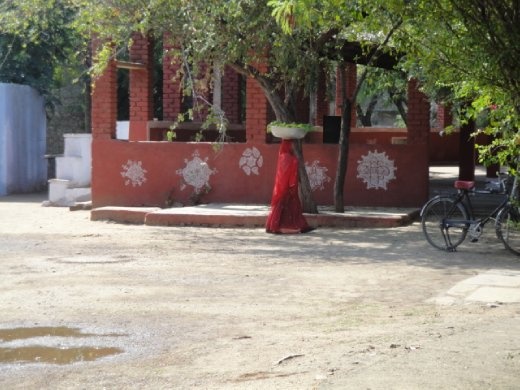
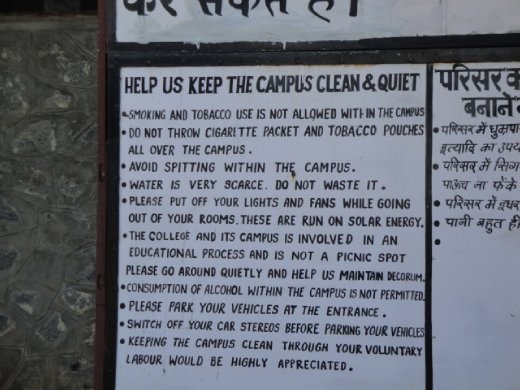
Barefoot College was founded in the 70's by a visionary man Bunker
Roy (for an inspirational video of the meeting between him and the Dalai Lama,
who had visited Barefoot a mere two days before us, watch http://www.barefootcollege.org/videos/Altruism2.htm ).
He felt that the way that India
was going to change was from the roots up. Harvesting and sharing the
time-tested wisdom of rural people, he began offering empowering classes
and apprenticeships that taught skills to primarily illiterate local women that
would help them transform the quality of life in their communities. They became
solar engineers, experts in water purification, dentists, healthcare workers,
architects, even menstrual pad makers. And of course gifted artisans.
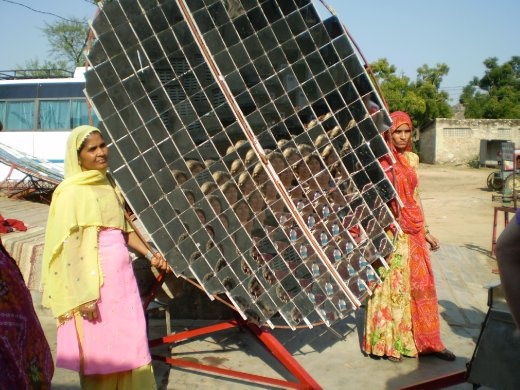
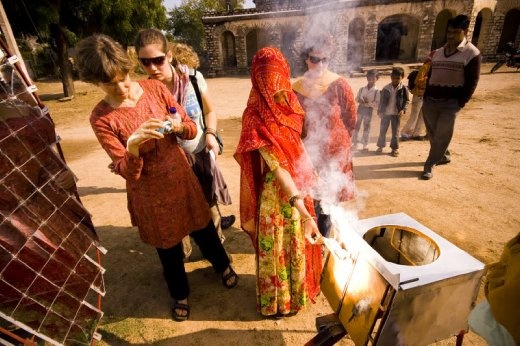
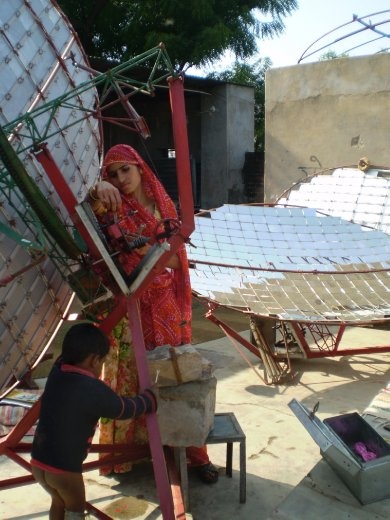
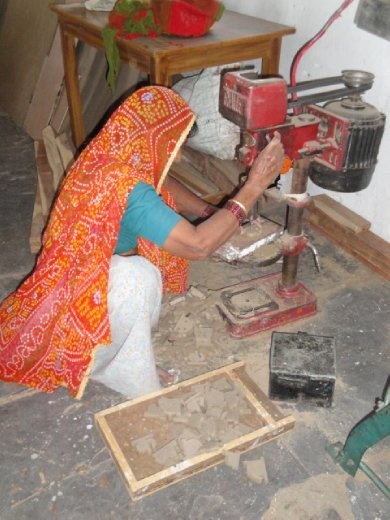
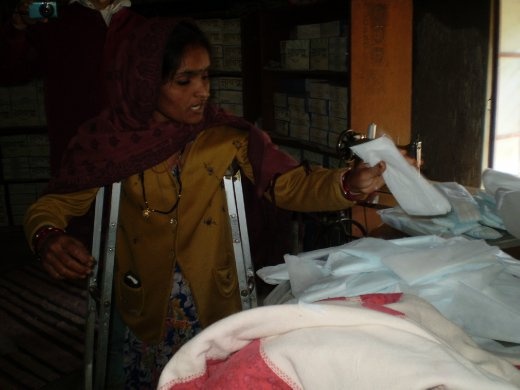
Ram Nivas showed us everywhere, explaining not only what was being
learned by each group of women, but the philosophy that infuses the school. He
shared his own personal story with us of having grown up a member of the
untouchable caste, and the emotional pain he endured while being heavily
ostracized as a young boy because of that. Bunker Roy trained him to be an accountant at the
college, which completely changed his life.
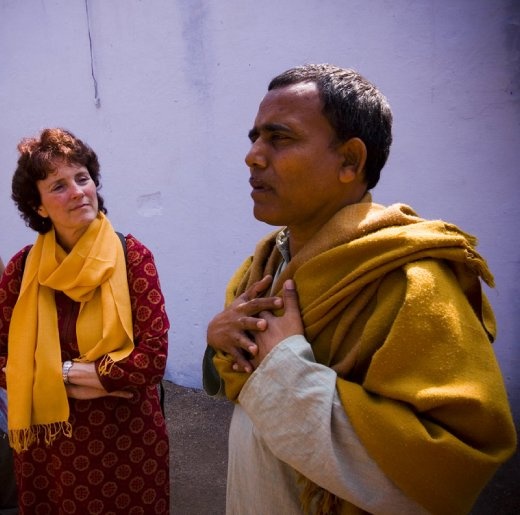
At Barefoot, there is no caste system at work. All are equal. All
are human. All have wisdom. All have intelligence. All have the power to change
their world.
When we got to the room where the puppets lived, his whole
demeanor came alive! He is a puppeteer. Several of us were reminded of Bread
and Puppet Theater as soon as we walked in that room. The room was filled with
puppets of all sizes and varieties, and a group of musicians awaited us.
Puppetry is a traditional art form in Rajasthan, and in the hands of Ram Nivas,
accompanied by the musicians, it is now being used to teach and challenge the
hearts and minds of its rural audiences on social issues such as domestic
violence, health care, water-borne diseases, etc....The rural communities
listen--it is the puppets who are doing the teaching.
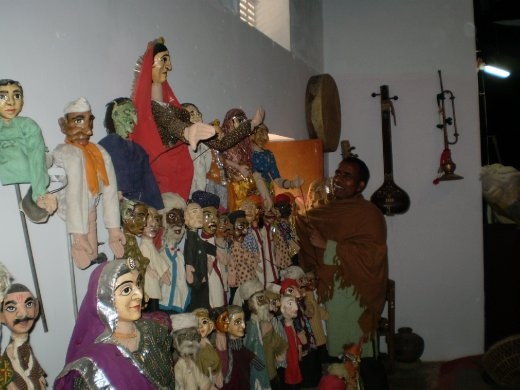
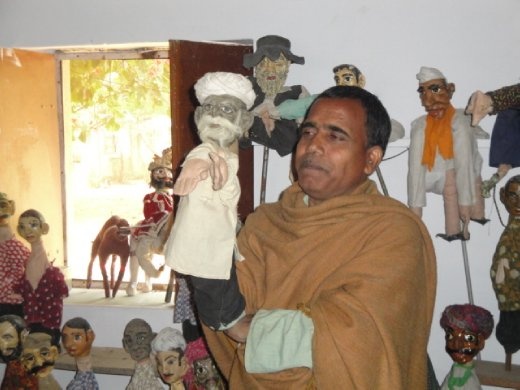
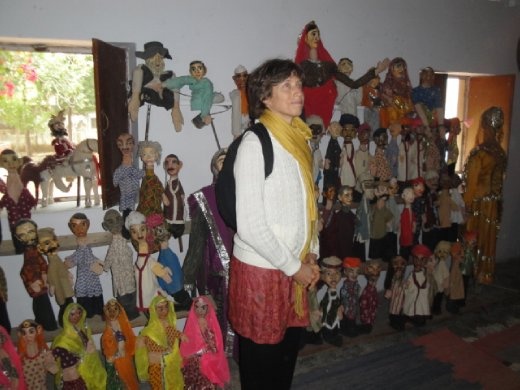
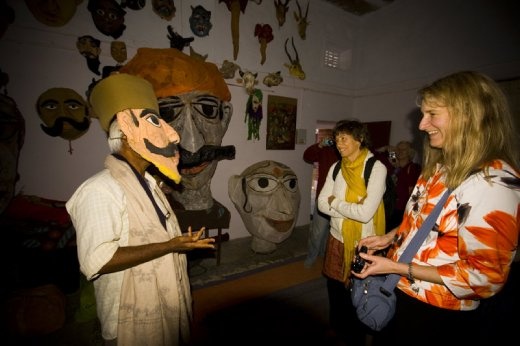
We were treated to several tribal songs by this traditional band --
2 singers (one of them Ram Nivas with his amazing voice), a harmonium, a 19
year old amazing drummer, clanging large hand cymbals... and then a small
puppet show. In this small, darkish room, the arts and social change were being
magically interwoven.
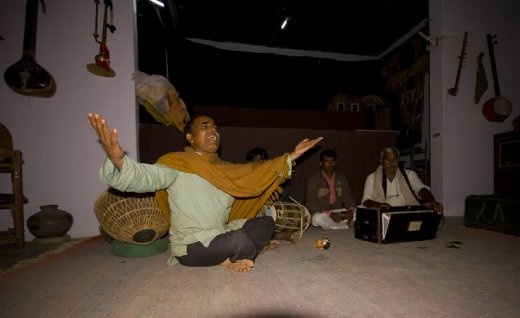
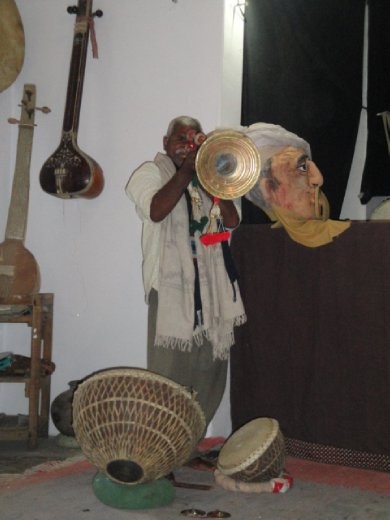
After a full day of visiting the activities of the college, and
having eaten two meals there, it was time to get ready for the concert we were
to give after dinner. There was an outdoor performing area with a stage
(opensided with a roof), illuminated with solar electricity generated by the
women there and three microphones. We had been told that an hour concert would
be long enough, and that that timeframe would include translations and a couple
of songs by some of the women at the college.
By the time they had found a table and a couple of chairs for us
(everything happens on the floor there), unpacked instruments, set up the
stage, figured out how to best use the three microphones and changed into our
wrinkled performance attire (no way to iron....) there was not even time to
vocally warmup. Our audience had assembled and Ram Nivas (who was to emcee the
evening) was ready to go. I asked him how the concert was going to be
organized. He said that he wanted his group of musicians to start with the
traditional summoning music (all drums, clanging cymbals and blown conch
shells...) and then we would sing our first song. After that? How about we
alternate? He would improvise an order of events and all would be well.
We were flexible. We were ready for anything. But we were in no
way prepared for the two hour spontaneous international music festival that
occurred on that stage that evening under solar lighting in the middle of rural
Rajasthan.
Although we knew that sometimes women from other parts of the
world would come apprentice at Barefoot, we had only met a small group of
Kenyan women earlier that afternoon who were making candles and working with electricity (a hearty rendition
of Kwaheri was sung together, followed by many hugs).
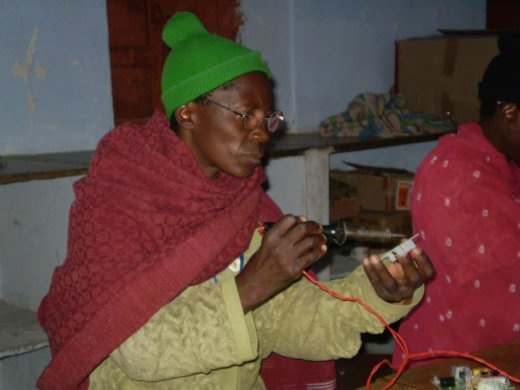
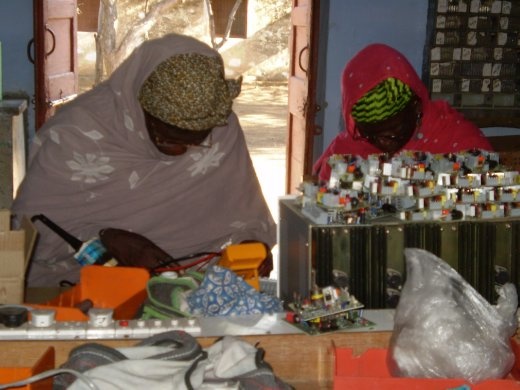
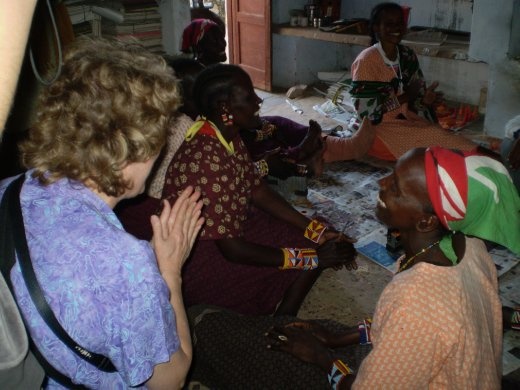
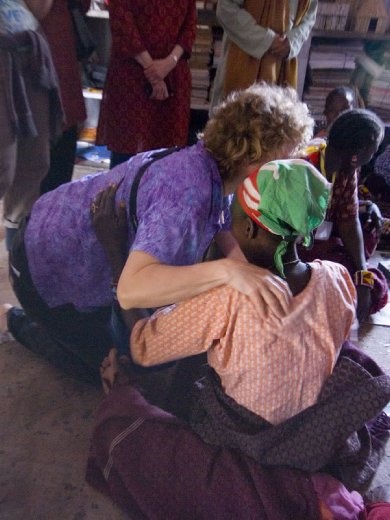
But in the
"audience" that evening were assembled women from many areas of India as well as Kenya,
the Congo, Burkina Faso, Jordan,
Guatemala, Columbia, and beyond.
What ensued was a festival of song by these "Barefoot
Engineers". We would sing a song, then Ram would summon the Masai women
from Kenya
who spontaneously laughed their way onto the stage and sang and danced
traditional song from their village. And then we would sing a song, and then
the women from Burkina Faso
would offer their tradition. No one knew this was going to happen. When we sang
Beleil, our Bedouin Arab song, the Jordanians erupted from their seats and
joined us on stage in disbelief, singing their hearts out (I was congratulated
on my oud playing by a somewhat shocked Jordanian at the end of the song.....).
On through the evening, one elated group of (mostly) women after another
(including us!) made their way onto the stage and with not a drop of
competitiveness and full of pride--all sharing our souls with each other. Even
our two Punjabi bus drivers joined the festivities! Needless to say, by the
time Allison and Linda had donned their Garba costumes, ready to dance this
traditional dance done across Gujarat and
Rajasthan, the audience went wild.
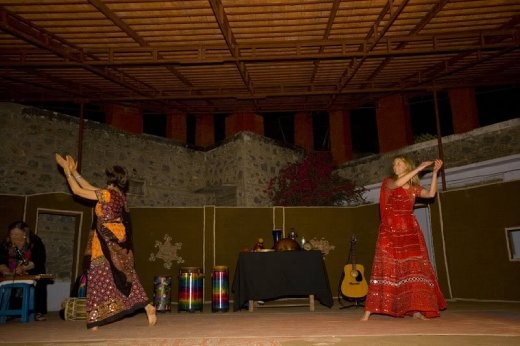
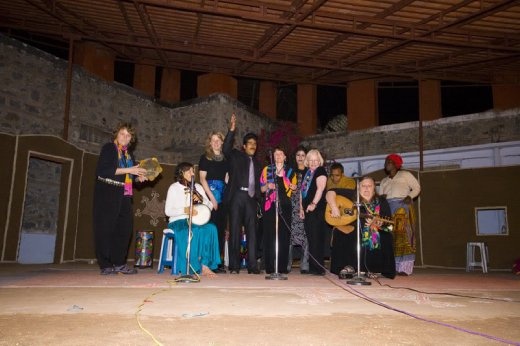
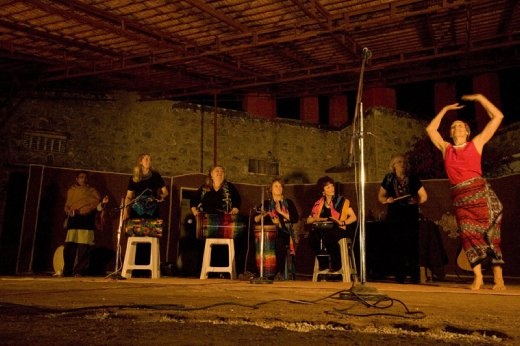

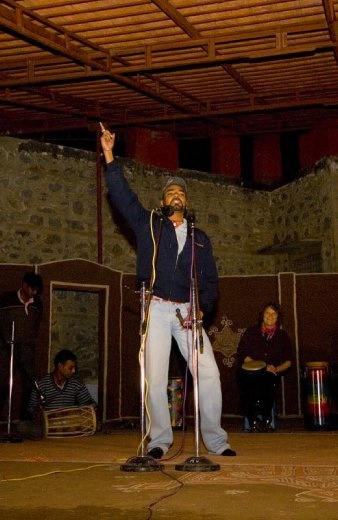
The evening came to a close with Ram requesting a rendition of We
Shall Overcome. We began, singing a verse on stage, followed by the audience
members singing it in Hindi, and then another verse by us, followed by a
version of that verse in Hindi.
Transcending any possible boundaries, the universal joy of shared
music and dance rang through the night air uniting us all in an unforgettable
sea of song.
And as soon as the music was over, the lights went out, leaving
only one solar powered lantern to illuminate the crowd of people that was
gathering onstage to look at our instruments and talk to us. An afterglow party
ensued (giving a total new meaning to that phrase). Gathered around that small
table with our instruments, it was requested that I play my hammered dulcimer.
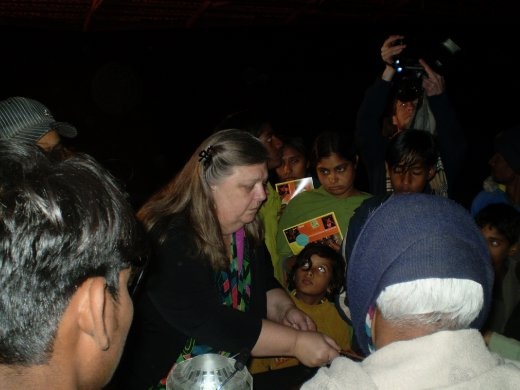
Improvising a little, everyone was transfixed, and for some reason that
prompted the Rajasthani musicians to sing another song which I jammed on my
hammered dulcimer with. Cheryl's husband Alan blew their conch shell (summoning
up his shofar blowing experience), and Marytha and I sang a Balkan song.
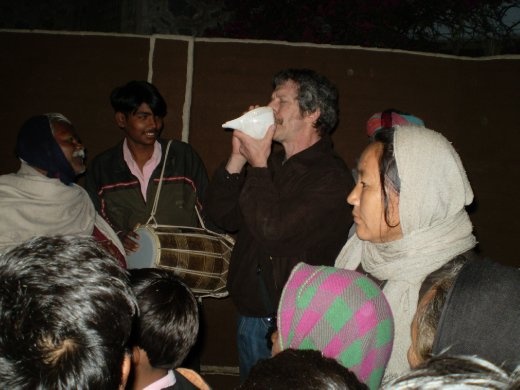
The
Rajasthani guys sang us a traditional goodbye song which we all LOVED (they
said it is mostly sung by women in the villages, and it will definitely make
its way into our repertoire!). Eventually everyone else had dispersed and all
instruments safely (and miraculously) returned to the safety of their cases,
leaving only some of Libana and Ram and his band of Rajasthani musicians (who
now, having seen us do our thing and having just moments before tried out every
drum and instrument, were incredibly animated and conversational). An invitation
ensued to come back and spend 6 months--Ram would take us around to all the
villages so we could learn thousands of songs.....
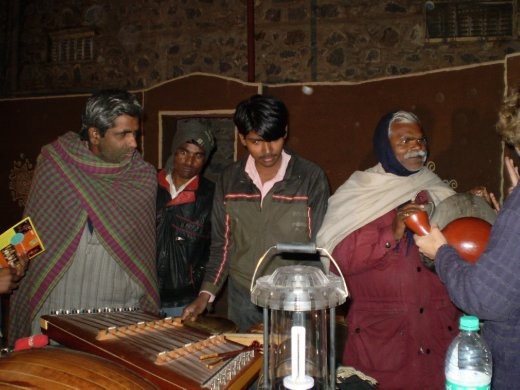
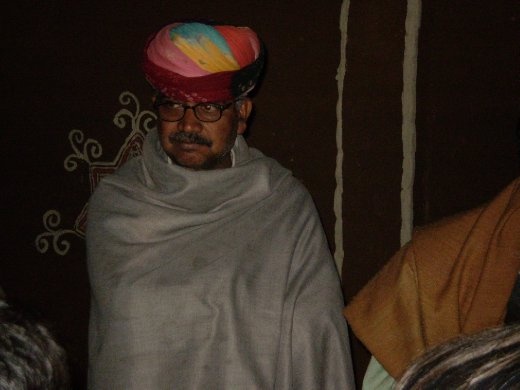
We stood there for quite awhile, by the light of a solitary
lantern talking, exchanging touring stories (this band had traveled to Europe
once), and.... much to our amazement (and yet again, not)--hearing Ram talk
about his time working with Peter Schumann and Bread and Puppet Theater while
in Germany!
He was blown away that Marytha and I have also sung in a couple of Bread and
Puppet productions.
How small a world can it possibly be? Or is it so vast that it is
beyond comprehension?
I do know that it was the spirit and essence of Libana's 31 years
together that catalyzed that amazing rural Happening. And it took Ram's
intuition to know that it was possible.
After a short night's sleep on those hard mattresses (and I will
not discuss the bathrooms), we woke to more birdsong and the best breakfast
chapatis imaginable. After many closing conversations and tearful hugs and
Namaste's, we got back on our bus, driven by our new best Punjabi friends, and
headed back to Jaipur to catch a plane to Ahmedabad, Gujarat.
I knew, as we drove back down that dirt road towards the highway,
that something sacred had happened.
Sue